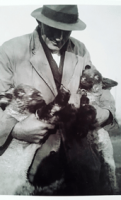Cianga | Poetry
SHEPHERD BRACKENBURY
My grandfather
Back in the thirties he would kill a sheep
each week, then hawk its meat round neighbouring farms.

When I was born, their hungry times had gone,
though he could still use knives in either hand.
I came once when he skinned a perished lamb
because he had another struggling one,
a triplet, trembling as it tried to stand.
He set it softly by the dead lamb’s dam,
the small stained fleece knotted around its neck.
She let it feed once she had sniffed its back.
Best shoes scratched by rough straws, I learned love meant
not glances, silky curls, but blood’s raw scent.
SUNDAY ON THE COACH
It is June. Tall grasses nod. On the back seat
the last baby has hiccupped into sleep.
No one swears, nobody phones. The south wind whistles
white motorways of cow parsley and thistles.
A helicopter hangs, but does not strafe.
This afternoon the innocent are safe.
CHARLES DICKENS AT HOME
Bombs, cranes made his grand houses
mere rubble under feet
but not their narrow first door,
48 Doughty Street.
Kind Catherine clasped the baby
Dickens set up his desk.
He rattled sherry bottles.
She counted out the eggs.
The basement stairs could break knees.
Her belly twitched, stretched sore.
Charles frowned across the garden
Oliver asked for more.
Slowly, Kate shuffled menus,
sweet salvage of her life.
“What Shall We Have for Dinner?”
He wrote Is She his Wife?
Spring Soup, then Vermicelli.
The hospital fund. Grey curls.
Oxtail, Mock Turtle. Hare Soup.
The house for fallen girls.
His favourite child was Katey,
who painted, laughed, dared turn
to snatch the frail reading desk
her father chose to burn.
Behind his tallest, last house,
with Catherine packed away
he lit his bundled letters.
“I have no more to say.”
The profile of his actress
shows tension, sharp-lipped grace,
not Catherine’s muddled ringlets
not unlike Katey’s face.
“We live in all our houses.”
ash whispers to the sleet.
Lime buds tap bedroom windows,
upstairs, in Doughty Street.
♦
NOTES: In 1851, under the name of Lady Maria Clutterbuck, Catherine Dickens published a book of meal plans: “What Shall We Have for Dinner?”
Is She his Wife? is the title of an early play by Charles Dickens.
Dickens had a desk built for his reading tours. When illness forced him to stop, he planned to burn this.
Catherine and Charles Dickens had ten children. Dickens separated from his wife in 1858. In the last years of his life, he had a secret relationship with a young actress, Ellen Ternan.
“I have no more to say” is the final sentence of a letter from Dickens to his publishers, Evans and Bradbury. He quarrelled with them over their support for Catherine.
Subscribe to Read More